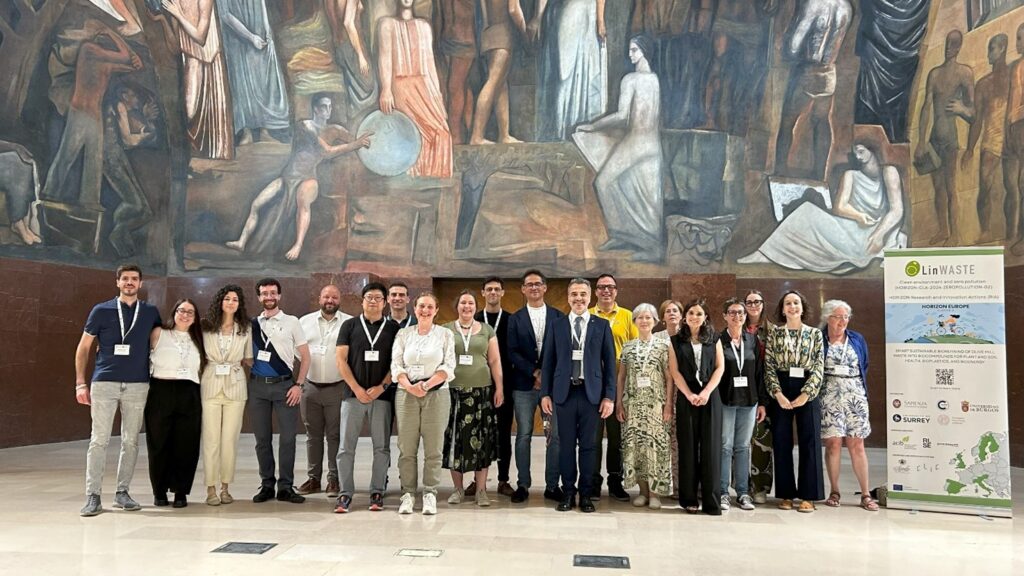OLinWASTE – Smart sustainable biorefining of olive mill waste into biocompounds for plant and soil health, bioplastics, and bioenergy
The EU is the world’s top producer, consumer, and exporter of olive oil, accounting for around 67% of global output. Behind this success lies a growing environmental and economic challenge: managing the large volumes of waste generated during olive oil production. This waste—known as olive mill waste (OMW) includes pomace, stones, and leaves, with up to 9.6 million tons produced annually in Europe alone. Current disposal methods, such as composting, landfilling, and specialized treatment, are costly and can account for up to 10% of total production expenses.
Improper waste management can lead to soil degradation, water pollution, and harm to local ecosystems due to the high content of organic compounds and heavy metals in OMW. With rising pressure to reduce chemical use and improve sustainability, OLinWASTE aims to create innovative solutions to turn this waste into valuable bioproducts, transforming a costly problem into a profitable opportunity.
OLinWASTE develops an integrated and innovative zero-emission biorefinery, utilizing green chemistry and microbial processes to transform agro-industrial waste and by-products into valuable resources. The project aims to valorize these by-products into plant bioimmunostimulants, biopesticides, biofertilizers, bioplastics, and bioenergy, reducing greenhouse gas emissions, optimizing waste flows, and recovering thermoelectric energy. The project also aims to minimize biorefinery emissions, noise, and odors. A digital twin system will be engineered to optimize waste treatment, integrating machine learning to simulate real-time operations and improve efficiency and carbon footprint. Iterative life cycle impact assessment will guide the innovations to guarantee a sustainable by design approach.
The OLinWASTE project, coordinated by Vincenzo Lionetti from Sapienza University Rome, was selected under the Horizon Europe 2021-2027 program, Innovative Technologies for zero pollution, zero-waste biorefineries – HORIZON-Cluster 6 – 2024-ZEROPOLLUTION.
OLinWASTE receives 4 Million € of funding from the European Commission and will last for 4 years.
“We are proud to lead a project that brings together cutting-edge science, green technology, and real-world application to make Europe’s bioeconomy more circular and resilient,” says Prof. Vincenzo Lionetti, project coordinator.
Sapienza University is the project leader of OLinWASTE, which includes 9 partners from 6 European countries: Italy, Sweden, Spain, Austria, the United Kingdom, and Finland. The consortium consists of 4 European universities, including Sapienza, the University of Padua, Cranfield University, Universidad De Burgos, University of Surrey, three research centers, the Austrian Centre of Industrial Biotechnology (ACIB), the Research Institutes of Sweden (RISE), and Rise Processum (RISEP), an Agrolio-Agroenergy biorefinery, and an open innovation cluster CLIC Innovation Oy.
The role of CLIC Innovation is to support the administration, as well as communication, dissemination, and exploitation of the project results.
In the kick-off meeting of the OLinWASTE project from 18th to 19th of June 2025 in Rome the consortium met the EU project advisor. The highly motivated project team started their close collaboration with the Italian olive mill, which also runs a biogas plant, for developing a fully integrated biorefinery.
To learn more about the project, contact project coordinator Vincenzo Lionetti at vincenzo.lionetti@uniroma1.it.
“This project has received funding from the European Union’s Horizon Europe research and innovation programme under grant agreement No 101181402. Views and opinions expressed are however those of the author(s) only and do not necessarily reflect those of the European Union. Neither the European Union nor the granting authority can be held responsible for them.”

